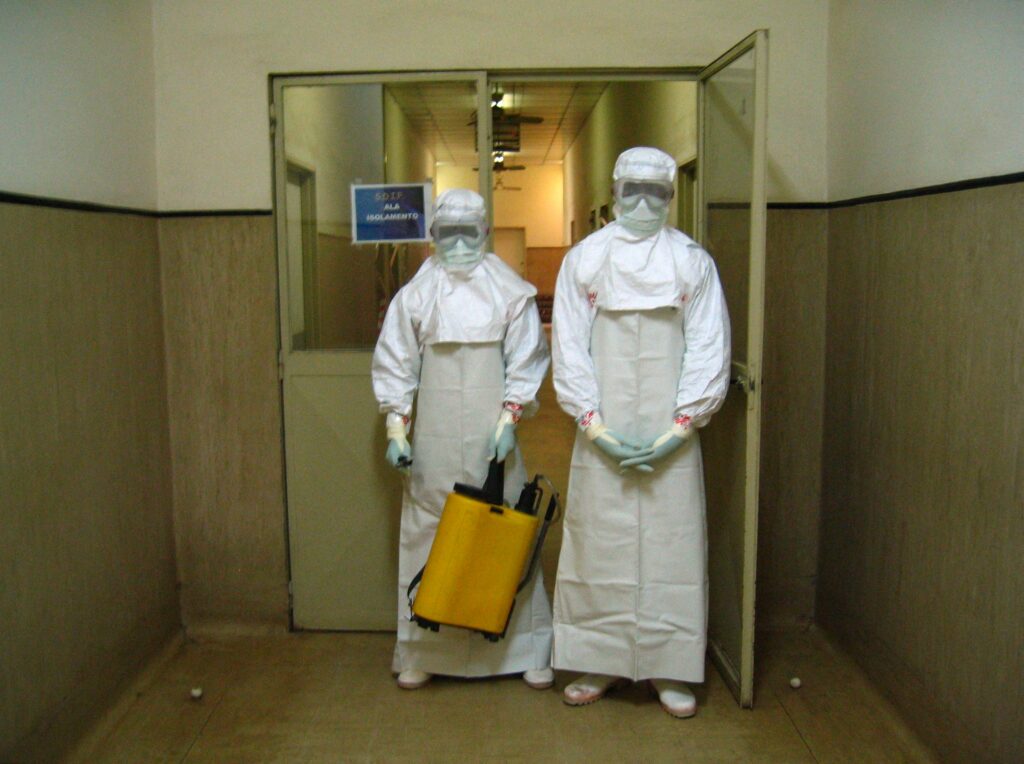The Marburg Virus, which can have an 88 percent fatality rate, has now killed 11 people in Rwanda as the East African country continues to investigate the source of the outbreak.
Currently, there are 36 confirmed cases of the disease, which manifests in a similar way to Ebola, with 25 of those individuals in isolation according to the latest update from the Rwandan government.
Rwanda declared the outbreak on Sept. 27 and reported six deaths the following day. At that time, authorities stated that the first cases had been identified among patients in health care facilities and confirmed that an investigation was underway “to determine the origin of the infection.”
A medical worker from the Infection Prevention and Control unit wearing full protective equipment carries a meal to an isolation tent housing a man being quarantined after coming into contact in Uganda with a carrier…
A medical worker from the Infection Prevention and Control unit wearing full protective equipment carries a meal to an isolation tent housing a man being quarantined after coming into contact in Uganda with a carrier of the Marburg Virus, at the Kenyatta National Hospital in Nairobi, Kenya. In Rwanda, 36 cases of Marburg have been confirmed so far, the country’s health ministry reported.
More
Ben Curtis/AP Photo
Days later, the source remains unclear, raising contagion fears in this small central African nation. Isolating patients and their contacts is crucial to stopping the spread of viral hemorrhagic fevers such as Marburg. At least 300 individuals who came into contact with confirmed Marburg cases have been identified, and an unspecified number of them are now in isolation facilities, according to local health authorities.
Rwandans are being urged to avoid physical contact to help curb the spread of the virus. Most of the affected individuals are health care workers across six out of the country’s 30 districts. The U.S. Embassy in Rwanda’s capital, Kigali, has urged its staff to work remotely and avoid visiting offices, reflecting a growing concern over the safety of individuals in the area.
Two health workers, wearing protection outfits, leave the isolated area where people infected by the deadly Marburg virus are treated at the Americo Boa Vida hospital 03 April 2005, in Luanda, Angola. Marburg outbreaks and…
Two health workers, wearing protection outfits, leave the isolated area where people infected by the deadly Marburg virus are treated at the Americo Boa Vida hospital 03 April 2005, in Luanda, Angola. Marburg outbreaks and individual cases have in the past been recorded in Tanzania, Equatorial Guinea, Angola, Congo, Kenya, South Africa, Uganda and Ghana, according to the WHO. On Thursday, Rwanda recorded at least 11 deaths from its Marburg outbreak.
More
Florence Panoussian/Getty Images
Similar to Ebola, the Marburg virus is believed to originate in fruit bats and spreads among people through close contact with the bodily fluids of infected individuals or surfaces, such as contaminated bed sheets. Without treatment, Marburg can be fatal in up to 88 percent of those who contract the disease. Symptoms include fever, muscle pains, diarrhea, vomiting, and, in some cases, death due to extreme blood loss.
The World Health Organization (WHO) has documented Marburg outbreaks and individual cases in countries including Tanzania, Equatorial Guinea, Angola, Congo, Kenya, South Africa, Uganda, and Ghana. The virus was first identified in 1967 after causing simultaneous outbreaks in laboratories in Marburg, Germany, and Belgrade, Serbia. Seven individuals died after being exposed to the virus while conducting research on monkeys.
Transmission electron micrograph (TEM) of the Marburg virus. The virus, first recognized in 1967, causes a severe type of hemorrhagic fever, which can be fatal to humans. Rwanda’s Marburg fever deaths have risen to 11…
Transmission electron micrograph (TEM) of the Marburg virus. The virus, first recognized in 1967, causes a severe type of hemorrhagic fever, which can be fatal to humans. Rwanda’s Marburg fever deaths have risen to 11 as its source continues to be investigated.
More
Smith Collection/Getty Images
Health authorities are working to contain the outbreak and ensure the safety of the population. The situation remains fluid, with health officials urging the public to remain vigilant and adhere to safety guidelines. National and international health agencies are collaborating to implement effective response strategies, including contact tracing and education on preventive measures.
This article includes reporting from The Associated Press
Source link : https://www.newsweek.com/marburg-virus-outbreak-kills-11-rwanda-investigation-continues-1963210
Author :
Publish date : 2024-10-03 17:48:32
Copyright for syndicated content belongs to the linked Source.
